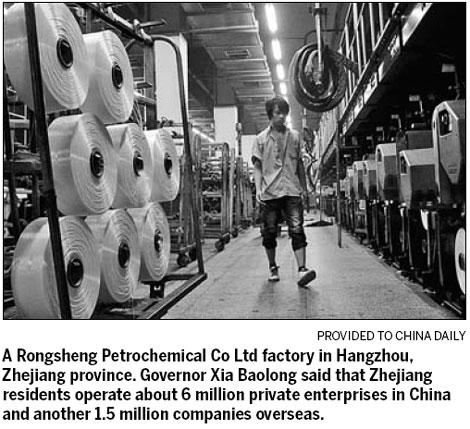Entrepreneurs in Zhejiang call for funding channels
 0 Comment(s)
0 Comment(s) Print
Print E-mail China Daily, March 14, 2012
E-mail China Daily, March 14, 2012

Some of the most influential entrepreneurs in Zhejiang province, the powerhouse of the nation's flourishing private sector, are calling for easier policies on funding channels for micro-sized and small private enterprises.
These business owners, who are deputies to the ongoing annual session of the National People's Congress, have urged the government to allow the establishment of private banks.
Because of financing difficulties, last year was a tough one for private manufacturing companies, said Nan Cunhui, chairman of Chint Group Corp, the country's biggest maker of low-voltage electrical apparatus.
Nan suggested that the government should lift curbs on private financing organizations and let private companies set up commercial banks to help cash-starved small companies.
According to a report from the All-China Federation of Industry & Commerce, more than 90 percent of small and medium-sized companies surveyed couldn't get loans from banks. About 62.3 percent of their financing came from private lenders in the past three years.
The huge demand has led to widespread illegal banking activities and left small companies more vulnerable to loan sharks and ill-regulated underground banks amid tight monetary conditions.
The unitary financial system is the key factor causing financing problems for the small and medium-sized enterprises, said Nan, a deputy to the NPC. He suggested channeling private capital into the financial sector and have sound regulations.
Nan's suggestion drew strong support from other entrepreneurs in the province. Zhao Linzhong, chairman of Furun Holding Group Co, which specializes in textile and wool manufacturing from its base in Zhejiang's Zhuji city, said that it's essential to accelerate financial system reforms. Zhao said it was necessary to break up the banking monopoly and direct financial institutions to support the real economy, which is mostly related to manufacturing and services.
Zhao, also an NPC deputy, called for stronger backing from the government for small-credit companies and other regional financial institutions.
Zhejiang is home to about 6 million private enterprises in China and an additional 1.5 million overseas, the province's governor Xia Baolong said.
Apart from policy support for the establishment of private banks, Zong Qinghou, chairman of Hangzhou Wahaha Group, the country's biggest beverage producer, suggested the banking regulator should strengthen supervision and establish sound risk-control systems to head off lending risks.
Premier Wen Jiabao said in his annual Government Work Report that the government will support the development of non-public businesses and ease entry barriers to draw more private capital into the finance, rail transportation, energy and telecommunications industries.
The State Council released rules, the "New 36 Guidelines", in 2010 to propel private capital into monopolized industries including infrastructure, public housing, public services and financial services. But there's been little improvement so far because of the absence of effective and applicable measures and the resistance of State-owned companies.
Zhuang Qichuan, president of the toiletry products retailer Zhejiang Nice Group, said meeting the goal of having private banks was "a long way off" without radical interest-rate reforms and a concrete implementation of the 36 guidelines.
Nan suggested allowing Wenzhou, the cradle for private business in China, to set up a financial reform pilot zone as an initial place to test private banks.






Go to Forum >>0 Comment(s)